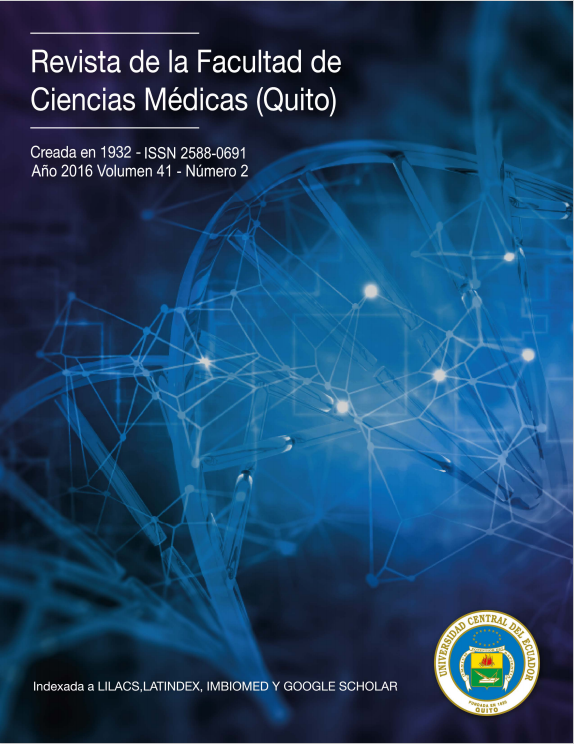Poca adherencia al tratamiento farmacológico en pacientes hipertensos que acuden al hospital del IESS en Esmeraldas
Keywords:
Morisky-Green, adherence, hypertensionAbstract
Context: it is usual to identify reduced adherence to the pharmacological treatment of arterial hypertension, which increases mortality due mainly to chronic non-communicable diseases. Objective: to determine adherence to drug treatment in hypertensive patients, treated at the General Hospital of the Ecuadorian Social Security Institute of Esmeraldas. Methods: an observational, descriptive and cross-sectional study was conducted on patients interviewed in an outpatient clinic using the Morisky-Green Test, to assess adherence to antihypertensive drug treatment. Results: 247 patients were studied, 58.7% men with a disease time from May to 3 years (61.3%). Adherence to pharmacological treatment was 47.4%, with greater adherence being observed in individuals with a marital status and higher education (p <0.05). Conclusion: adherence to drug treatment in hypertensive patients is less than 50% and it is positively related to the degree of education.
Downloads
Metrics
References
INEC. Anuario de Estadísticas Hospitalarias Nacimientos y Defunciones. Ecuador, 2014.
Lisspers, J., Sundin, O., Ohman, A., Hofman, C., Ryden, L. & Nygren, A.Long-Term Effects of Lifestyle Behavior Change in Coronary Artery Disease: Effects on Recurrent Coronary Events After
Percutaneous Coronary Intervention. Health Psychology, 24, 1-4. 2005.
Holguín L, Correa D, Arrivillaga-Quintero M, Varela MT, Cáceres D. Adherencia al tratamiento de
hipertensión arterial: efectividad de un programa de intervención biopsicosocial. Universitas Psychologica. 2006; 5: 535-548.
Joint National Committee on Prevention, Detection, Evaluation and Treatment of High Blood Pressure. The sixth report of the Joint National Committee on prevention, detection, evaluation and treatment of high blood pressure. Arch Intern Med 1997; 157: 2413-2446.
Whelton SP, Chin A, Xin X, He J. Effect of aerobic exercise on blood pressure: a meta-analysis of randomized, controlled trials. Ann Intern Med 2002; 136 (7):493-503.
Kaplan N. Hypertension in the population at large. En: Clinical Hypertension. 5th Edition. Baltimore-Maryland: Williams & Wilkings; 1990. p. 12-15.
OMS. Adherence to long-therm therapies. Evidence for action. Geneve. 2004
Bimbela JL. El counseling en atención primaria. Jano.2002; 63(1453): 54-60.
Meichenbaum, D. & Turk, D. C. Cómo facilitar el seguimiento de los tratamientos terapéuticos. Madrid 2001.
Amigo I, Fernández, C, Pérez, M. Manual de Psicología de la salud. Madrid: Pirámide. Appel, L. J.
(2000).
Sabaté E. Adherence To Long - Term Therapies, Evidence for action. World Health Organization.
Disponible en: http://www.who.int/chp/knowledge/ publications/adherence_full_report.pdf
Queiroz A, Velludo-Veiga E. Fatores que interferem na adesão terapêutica medicamentosa em hipertensos. Einstein (São Paulo), São Paulo, 2013 Sept;11(3).
Cáceres, F. Factores de riesgo para abandono (no adherencia) del tratamiento antituberculoso. MedUNAB. 2004; 7:172.
Jing J, Grant E, Vernon M, Shu C. Factors affecting therapeutic compliance: A review from the patient’s perspective. Ther Clin Risk Manag. 2008; 4(1):269–286.
Ramli A. Ahmad N. Medication adherence among hypertensive patients of primary health clinics in
Malaysia. Dove Medical Press. 2012;(6):613-622.
Karaeren H, Yokuşoğlu M, Uzun S, Baysan O, Köz C, Kara B, et al. The effect of the content of the
knowledge on adherence to medication in hypertensive patients. Disponible en: http://www.ncbi.
nlm.nih.gov/pubmed/19520651
Trivedi R, Ayotte B, Edelman D, Bosworth H. The Association of Emotional Well-being and Marital
Status with Treatment Adherence among Patients with Hypertension. Disponible en: http://www.
ncbi.nlm.nih.gov/pubmed/18780175
Noda-Milla J, Pérez-Lu JE, Málaga G, et al. Conocimientos sobre su enfermedad en pacientes con
diabetes mellitus tipo 2 que acuden a hospitales generales. Rev Med Hered 2008;19(2):46-47.
Weymiller AJ, Montori VM, Jones LA, et al. Helping patients with type 2 diabetes mellitus make treatment decisions: statin choice randomized trial. Arch Intern Med 2007;167(10):1076-82.
Mann DM, Ponieman D, Montori VM, Arciniega J, McGinn T. The Statin Choice decision aid in
primary care: A randomized trial. Patient Educ Couns 2010; 80(1):138-40.
Málaga G, Sánchez-Mejía A. Medicina basada en evidencia: Aportes a la práctica médica actual y
dificultades para su implementación. Rev Med Hered 2009; 20 (2): 103-109.
Downloads
Published
How to Cite
Issue
Section
License
Copyright (c) 2016 Rubén Páez-Landeta, Alejandro Páez-Llerena, Diego Cisneros Moscoso

This work is licensed under a Creative Commons Attribution-NonCommercial-NoDerivatives 4.0 International License.











